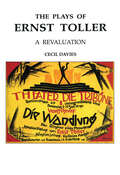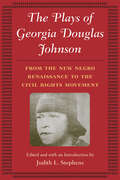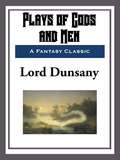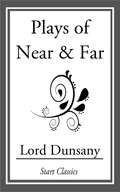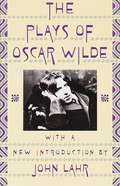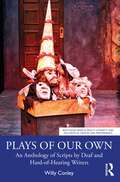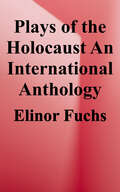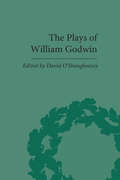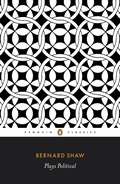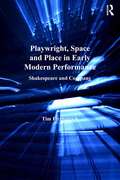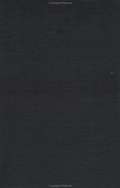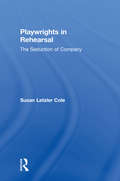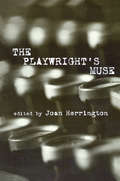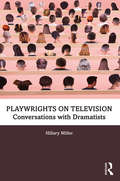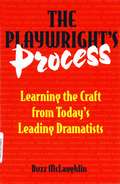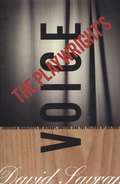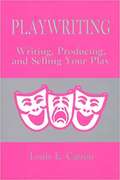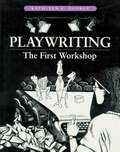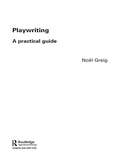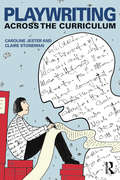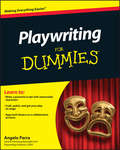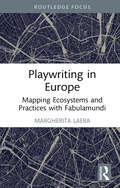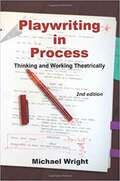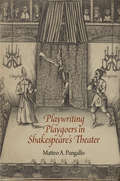- Table View
- List View
The Plays of Ernst Toller: A Revaluation
by Cecil DaviesThis book is the fullest and most detailed study yet published in English of Ernst Toller's plays and their most significant productions. In particular the productions directed by Karl-Heinz Martin, Jurgen Fehling and Erwin Piscator are closely analyzed and the author demonstrates how, brilliant though they were, they obscured or even distorted Toller's intentions. The plays are seen as eminently stage-worthy while worth lies in Toller's use of language, both in prose and inverse. The neglected puppet-play The Scorned Lovers' Revenge is analyzed from a new perspective in the light, both of its language and its sexual theme, so important in Toller's writings as a whole. The reader is led to appreciate why Toller was regarded as the most outstanding German dramatist of his generation until, after his death in 1939 his reputation was overlaid by that of Brecht. This book should do much to restore Toller to his proper place in theatre history.
The Plays of Eugene O'Neill: A New Assessment
by Virginia FloydVirginia Floyd draws on her extensive knowledge of the playwright Eugene O'Neill's work and of his notebooks at Yale University to examine the composition and significance of all the plays, including those unpublished. In chronological order she deals with the significance of each play, assessing its autobiographical as well as literary aspects.
The Plays of Georgia Douglas Johnson: From the New Negro Renaissance to the Civil Rights Movement
by Georgia Douglas JohnsonRecovering the stage work of one of America's finest black female writers This volume collects twelve of Georgia Douglas Johnson's one-act plays, including two never-before-published scripts found in the Library of Congress. As an integral part of Washington, D.C.'s, thriving turn-of-the-century literary scene, Johnson hosted regular meetings with Harlem Renaissance writers and other artists, including Countee Cullen, Langston Hughes, May Miller, and Jean Toomer, and was herself considered among the finest writers of the time. Johnson also worked for U.S. government agencies and actively supported women's and minorities' rights. As a leading authority on Johnson, Judith L. Stephens provides a brief overview of Johnson's career and significance as a playwright; sections on the creative environment in which she worked; her S Street Salon; "The Saturday Nighters," and its significance to the New Negro Theatre; selected photographs; and a discussion of Johnson's genres, themes, and artistic techniques.
Plays of Gods and Men
by Lord DunsanyEdward John Moreton Drax Plunkett, 18th Baron of Dunsany was an Anglo-Irish writer and dramatist, notable for his work in fantasy published under the name Lord Dunsany. More than eighty books of his work were published, and his oeuvre includes hundreds of short stories, as well as successful plays, novels and essays. Born to one of the oldest titles in the Irish peerage, he lived much of his life at perhaps Ireland's longest-inhabited home, Dunsany Castle near Tara, received an honourary doctorate from Trinity College, and died in Dublin.
Plays of Near & Far
by Lord DunsanyEdward John Moreton Drax Plunkett, 18th Baron of Dunsany was an Anglo-Irish writer and dramatist, notable for his work in fantasy published under the name Lord Dunsany. More than eighty books of his work were published, and his oeuvre includes hundreds of short stories, as well as successful plays, novels and essays. Born to one of the oldest titles in the Irish peerage, he lived much of his life at perhaps Ireland's longest-inhabited home, Dunsany Castle near Tara, received an honourary doctorate from Trinity College, and died in Dublin.
Plays of Oscar Wilde (Vintage Classics)
by Oscar WildeThis Vintage edition of The Plays_of Oscar Wilde contains the plays that made Wilde one of the most important dramatists of his time, including The Importance of Being Earnest, one of the great works of modern literature.Oscar Wilde's plays demonstrate once again why their author must be seen as both an inaugurator and a master of modernism. In his best work, the subversive insights embedded in his wit continue to challenge our common assumptions. Wilde's ability to unsettle and startle us anew with his radical vision of the artifice inherent in the self's construction makes him our contemporary.This edition is introduced by John Lahr, author of Prick Up Your Ears: The Biography of Joe Orton. The plays included are Lady Windermere's Fan, Salome, A Woman of No Importance, An Ideal Husband, and The Importance of Being Earnest.From the Trade Paperback edition.
Plays of Our Own: An Anthology of Scripts by Deaf and Hard-of-Hearing Writers (Routledge Series in Equity, Diversity, and Inclusion in Theatre and Performance)
by Willy ConleyPlays of Our Own is the first anthology of its kind containing an eclectic range of plays by Deaf and hard-of-hearing writers. These writers have made major, positive contributions to world drama or Deaf theatre arts. Their topics range from those completely unrelated to deafness to those with strong Deaf-related themes such as a dreamy, headstrong girl surviving a male-dominated world in Depression-era Ireland; a famous Spanish artist losing his hearing while creating his most controversial art; a Deaf African-American woman dealing with AIDS in her family; and a Deaf peddler ridiculed and rejected by his own kind for selling ABC fingerspelling cards. The plays are varied in style – a Kabuki western, an ensemble-created variety show, a visual-gestural play with no spoken nor signed language, a cartoon tragicomedy, historical and domestic dramas, and a situation comedy. This volume contains the well-known Deaf theatre classics, My Third Eye and A Play of Our Own. At long last, directors, producers, Deaf and hearing students, professors, and researchers will be able to pick up a book of "Deaf plays" for production consideration, Deaf culture or multicultural analysis, or the simple pleasure of reading.
Plays of the Holocaust: An International Anthology
by Elinor FuchsOf all the literature about the devastation of the Jewish people under the Third Reich, the plays are the least familiar. Even in major studies of Holocaust writing, theatre is scarcely mentioned. <p><p>This volume gathers together some of the most important of these plays, chosen from scores of works searched out in Eastern and Western Europe, Britain, America and Israel. Each is from a different country, its universal theme filtered through its originating culture. All are persuasive as theatrical experience. And crucially, all are compelling as human experience.
The Plays of William Godwin (The Pickering Masters)
by David O'ShaughnessyBest known for "Enquiry Concerning Political Justice" (1793) and "Caleb Williams" (1794), William Godwin (1756-1836) is one of the most important figures of the Romantic period. This book offers academics the chance to build a complete picture of Godwin as a writer and political figure.
Plays Political: The Apple Cart, On the Rocks, Geneva
by Dan Laurence George Bernard ShawWhile some of Shaw’s earlier plays are still performed, his later plays, such as the ones in this volume, are barely known. As the collective title indicates, the themes here are political; yet, frankly, it is doubtful how seriously we can now take Shaw as a political thinker. Despite writing in the 1930s, he has little to say of the nature of totalitarianism: although he satirises Fascist dictators in “Geneva”, the satire is disappointingly mild. Neither did Shaw appear to foresee (on the evidence of these plays, at least) the imminent collapse of the British Empire.But it is Shaw the dramatist rather than Shaw the political philosopher who still holds our attention – even in plays as explicitly political as these. He had a sharp intellect and a quirky sense of humour, and his dialogue still glints and sparkles: he couldn’t write a dull line if he tried. No matter how serious the themes he addresses, the crispness of his writing and his lightness of touch still scintillate.Shaw seems, perhaps unfairly, out of fashion nowadays. But even in these lesser-known works, he demonstrates his matchless ability, still undimmed, to provoke and to entertain.
Playwright, Space and Place in Early Modern Performance: Shakespeare and Company (Studies In Performance And Early Modern Drama Ser.)
by Tim FitzpatrickAnalyzing Elizabethan and Jacobean playtexts for their spatial implications, this innovative study discloses the extent to which the resources and constraints of public playhouse buildings affected the construction of the fictional worlds of early modern plays. The study argues that playwrights were writing with foresight, inscribing the constraints and resources of the stages into their texts. It goes further, to posit that Shakespeare and his playwright-contemporaries adhered to a set of generic conventions, rather than specific local company practices, about how space and place were to be related in performance: the playwrights constituted thus an overarching virtual 'company' producing playtexts that shared features across the acting companies and playhouses. By clarifying a sixteenth- to seventeenth-century conception of theatrical place, Tim Fitzpatrick adds a new layer of meaning to our understanding of the plays. His approach adds a new dimension to these particular documents which-though many of them are considered of great literary worth-were not originally generated for any other reason than to be performed within a specific performance context. The fact that the playwrights were aware of the features of this performance tradition makes their texts a potential mine of performance information, and casts light back on the texts themselves: if some of their meanings are 'spatial', these will have been missed by purely literary tools of analysis.
Playwrights in Rehearsal: The Seduction of Company
by Susan Letzler ColePlaywrights in Rehearsal is an inside look at the writer's role in the creative process of bringing his or her words to life on stage. Susan Letzler Cole, granted rare access to some of the major playwrights of our time, recounts the participation in rehearsal of Arthur Miller, Sam Shepard, Tony Kushner, Suzan-Lori Parks, and others. She follows these writers from staged readings in small rooms to season-opening world premieres, as they work with such acclaimed directors as Joseph Chaikin, Mark Lamos, James Houghton, and Garland Wright, and with such distinguished actors as Kathleen Chalfant, Ellen McLaughlin, Charlayne Woodward, and Joseph Wiseman. Seeking to understand the playwright's role in the collaborative process of rewriting the script during rehearsal, Susan Cole examines the relation between the author's revision of the text and the director's reimagining of the script. Playwrights in Rehearsal vividly depicts both the pleasures and the tensions of playwrights working in company with actors, dramaturgs, and directors. In this revealing book, we see eight playwrights--who vary widely in age, fame, and dramatic technique--responding to the questions and dealing with the anxieties of their collaborators. As we watch and listen, and these writers watch and listen, plays come to life.
Playwrights in Rehearsal: The Seduction of Company
by Susan Letzler ColePlaywrights in Rehearsal is an inside look at the writer's role in the creative process of bringing his or her words to life on stage. Susan Letzler Cole, granted rare access to some of the major playwrights of our time, recounts her participation in rehearsal with Arthur Miller, Sam Shepard, Tony Kushner and Suzan-Lori Parks, and others.
The Playwright's Muse (Studies in Modern Drama #Vol. 13)
by Joan HerringtonFirst Published in 2002. Routledge is an imprint of Taylor & Francis, an informa company.
Playwrights on Television: Conversations with Dramatists
by Hillary MillerPlaywrights on Television features interviews with writers of award-winning stage plays and celebrated television shows reflecting on the successes and challenges of being a playwright in the post-network television era. In these conversations, eighteen dramatists consider their professional paths and creative choices, from training and education to thoughts on craft and technique, and discuss a range of issues relevant to the development of dramatic writing today. Theatergoers and TV aficionados alike will find new perspectives on the journeys traveled by some of their favorite plays and series, such as The Affair, The Americans, Boardwalk Empire, GLOW, House of Cards, Insecure, Mad Men, Orange Is the New Black, Shameless, She’s Gotta Have It, Vida, and The West Wing. A valuable resource for aspiring stage and television writers, as well as theater and media scholars investigating the works of these dramatists, Playwrights on Television sheds light on the role of the contemporary playwright in the latest Golden Age of television.
The Playwright's Process: Learning the Craft from Today's Leading Dramatists
by Buzz MclaughlinThis guide aims to teach the reader the craft of writing and producing stage drama. The book covers such topics as script format, arranging readings, contacting agents, and getting a full production. How to build a good plot, and producing a piece that will work on stage are also examined.
The Playwright's Voice
by David SavranThis new volume of interviews with contemporary playwrights attests to the fact the dramatic art is alive and well in America and celebrates the art and talent of fifteen of the theatre's most important artists. In extensive interviews, they discuss their work, influences and their craft and how the art form relates to our cultural heritage, as well as the state of theatre-its-meaning and purposes as we approach the 21st Century. David Savran lays out their remarkable achievements and provides telling insights to their work in his substantial introductions to each interview.Interviews with: Edward AlbeeJon Robin BaitzPhilip Kan GotandaHolly HughesTony KushnerTerrence McNallySuzan-Lori ParksJosé RiveraNtozake ShangeNicky SilverAnna Deavere SmithPaula VogelWendy WassersteinMac Wellman and George C. Wolfe.
Playwriting: Writing, Producing And Selling Your Play
by Louis E. CatronA practical guidebook for effective playwriting! This imaginative and enthusiastic book is designed especially for those having the desire to create, to entertain, and to express their emotions and ideas. It features a practical, down-to-earth emphasis on craft and structure rather than on theory as its step-by-step approach shows just what’s involved in creating a stageworthy play. Coverage includes basic considerations such as plot and character development, theme and dialogue as well as production and publication considerations. Outstanding features: offers concrete writing guidelines; includes exercises that get the reader going and inspirational anecdotes; presents excerpts from such classics as Macbeth, The Glass Menagerie, and The Dumb Waiter that help the student grasp key concepts; lists plays to read for instruction; includes valuable information not usually found in comparable collections.
Playwriting: The First Workshop
by Kathleen E. GeorgeThis is a practical introduction to the basic principles, structures and processes of writing plays. Beginning with simple concepts and exercises, this book gradually builds in complexity, until the reader is writing his or her one act play. Writing plays is unique because feedback, alternative approaches and discussion spur creativity. This book encourages this and thereby encourages the reader to write. The reader will discover how stage plays differ from screenplays, novels and television. The book also describes how autobiographical materials are transformed into playable parts, and how characters are moved by action. `Playwriting: The first workshop' gives readers the necessary background to begin working on their first play. Captures the workshop experience through writing, analyzing and testing plays. Contains synopsis and analysis of several well-known plays, such as `The Dining Room'. Each chapter provides study questions and exercises that reinforce important concepts.
Playwriting: A Practical Guide
by Noël GreigPlaywriting offers a practical guide to the creation of text for live performance. It contains a wealth of exercises for amateur and professional playwrights. Usable in a range of contexts, the book works as: a step-by-step guide to the creation of an individual play a handy resource for a teacher or workshop leader a stimulus for the group-devised play. The result of Noël Greig's thirty years' experience as a playwright, actor, director and teacher, Playwriting is the ideal handbook for anyone who engages with playwriting and is ultimately concerned with creating a story and bringing it to life on the stage.
Playwriting Across The Curriculum
by Claire Stoneman Caroline JesterFirst Published in 2012. Routledge is an imprint of Taylor & Francis, an informa company.
Playwriting For Dummies
by Angelo ParraThe easy way to craft, polish, and get your play on stage Getting a play written and produced is a daunting process. From crystallizing story ideas, formatting the script, understanding the roles of the director stagecraft people, to marketing and financing your project, and incorporating professional insights on writing, there are plenty of ins and outs that every aspiring playwright needs to know. But where can you turn for guidance? Playwriting For Dummies helps any writer at any stage of the process hone their craft and create the most dramatic and effective pieces. Guides you through every process of playwriting?from soliloquies, church skits, and one act plays to big Broadway musicals Advice on moving your script to the public stage Guidance on navigating loopholes If you're an aspiring playwright looking to begin the process, or have already penned a masterpiece and need trusted advice to bring it into the spotlight, Playwriting For Dummies has you covered.
Playwriting in Europe: Mapping Ecosystems and Practices with Fabulamundi (Routledge Advances in Theatre & Performance Studies)
by Margherita LaeraThis book maps contemporary playwriting and theatre translation practices and ecologies in the European continent. Whether you are a scholar researching contemporary drama and translation, or a theatre practitioner looking for ways to navigate theatrical conventions in other countries, this book is for you. Through questionnaires and one-to-one interviews with key stakeholders, Dr Laera collects qualitative and quantitative data about how each national theatre culture supports living dramatists, what conventions drive the production and translation (or lack thereof) of contemporary plays, and what perceptions are held by gatekeepers, theatre-makers and other cultural operators about the theatre system in which they work. Through country-by-country descriptions and analyses; interviews with playwrights, translators, directors and gatekeepers; a list of key facts and best practices; and a rigorous assessment of its methodologies, this volume is indispensable for those interested in contemporary European theatre practice.
Playwriting In Process: Thinking And Working Theatrically
by Michael WrightPlaywriting in Process: Thinking and Working Theatrically is written to encourage new and experienced playwrights to build techniques for a greater range of creative expression in writing for the stage. The book uses exercises to guide playwrights towards thinking and working theatrically. The exercises help playwrights start or revise their work by providing alternate ways of thinking about their subject and their processes. New to the second edition: new exercises, a general updating such as the use of the internet, a new chapter for teachers and playwriting group leaders on using this book in class, and end-of-chapter "Call Out" exercises. Useful for playwrights at all levels.
Playwriting Playgoers in Shakespeare's Theater
by Matteo A. PangalloAmong the dramatists who wrote for the professional playhouses of early modern London was a small group of writers who were neither members of the commercial theater industry writing to make a living nor aristocratic amateurs dipping their toes in theatrical waters for social or political prestige. Instead, they were largely working- and middle-class amateurs who had learned most of what they knew about drama from being members of the audience.Using a range of familiar and lesser-known print and manuscript plays, as well as literary accounts and documentary evidence, Playwriting Playgoers in Shakespeare's Theater shows how these playgoers wrote and revised to address what they assumed to be the needs of actors, readers, and the Master of the Revels; how they understood playhouse materials and practices; and how they crafted poetry for theatrical effects. The book also situates them in the context of the period's concepts of, and attitudes toward, playgoers' participation in the activity of playmaking.Plays by playgoers such as the rogue East India Company clerk Walter Mountfort or the highwayman John Clavell invite us into the creative imaginations of spectators, revealing what certain audience members wanted to see and how they thought actors might stage it. By reading Shakespeare's theater through these playgoers' works, Matteo Pangallo contributes a new category of evidence to our understanding of the relationships between the early modern stage, its plays, and its audiences. More broadly, he shows how the rise of England's first commercialized culture industry also gave rise to the first generation of participatory consumers and their attempts to engage with mainstream culture by writing early modern "fan fiction."
